2023届高考英语语法主谓一致课件(21张ppt)
文档属性
| 名称 | 2023届高考英语语法主谓一致课件(21张ppt) |  | |
| 格式 | pptx | ||
| 文件大小 | 303.7KB | ||
| 资源类型 | 教案 | ||
| 版本资源 | 通用版 | ||
| 科目 | 英语 | ||
| 更新时间 | 2023-01-12 20:34:59 | ||
图片预览

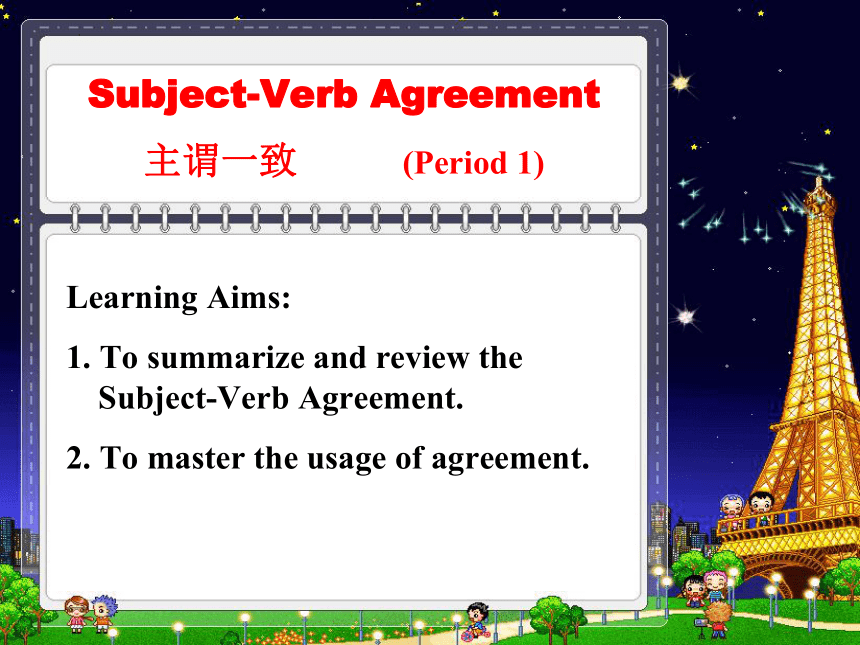
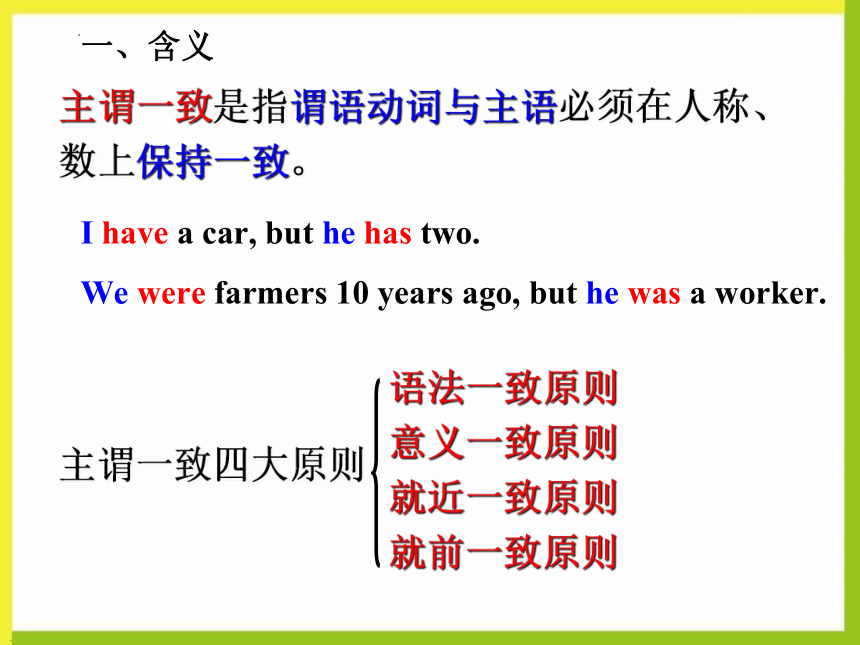
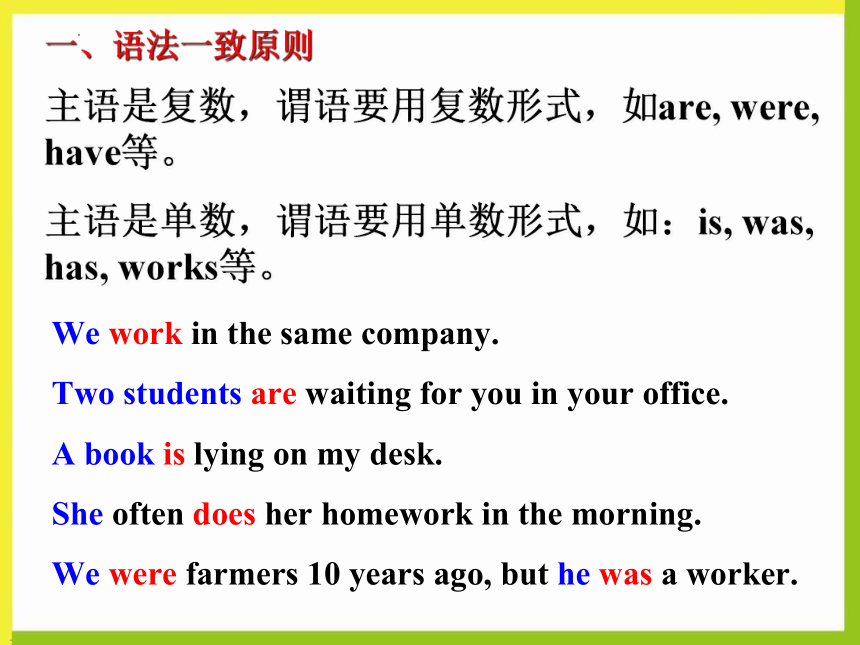
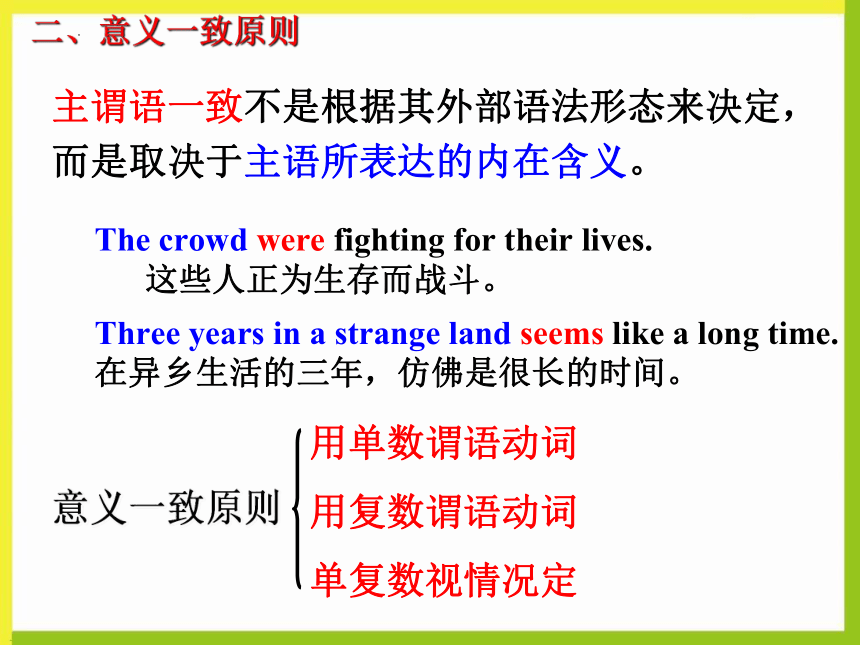
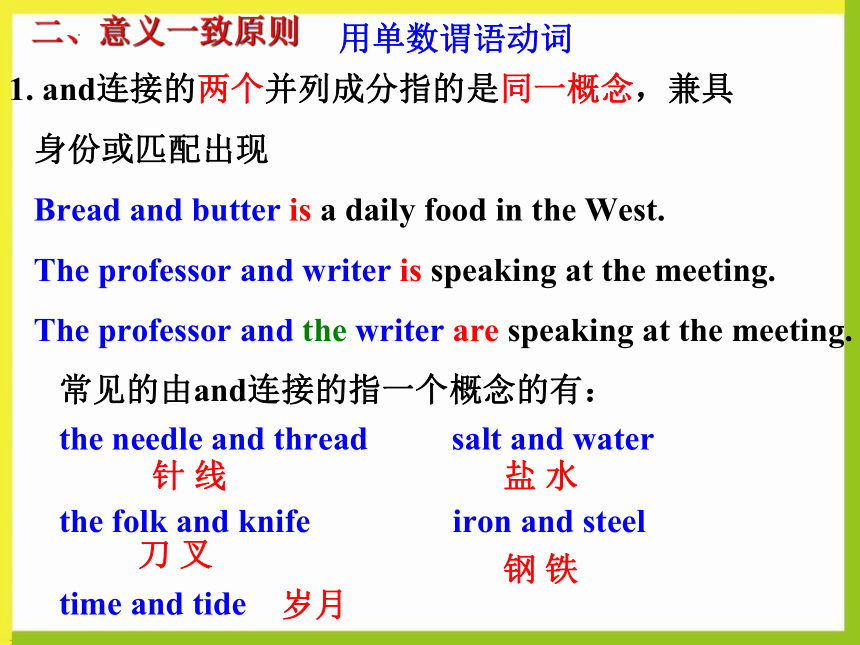
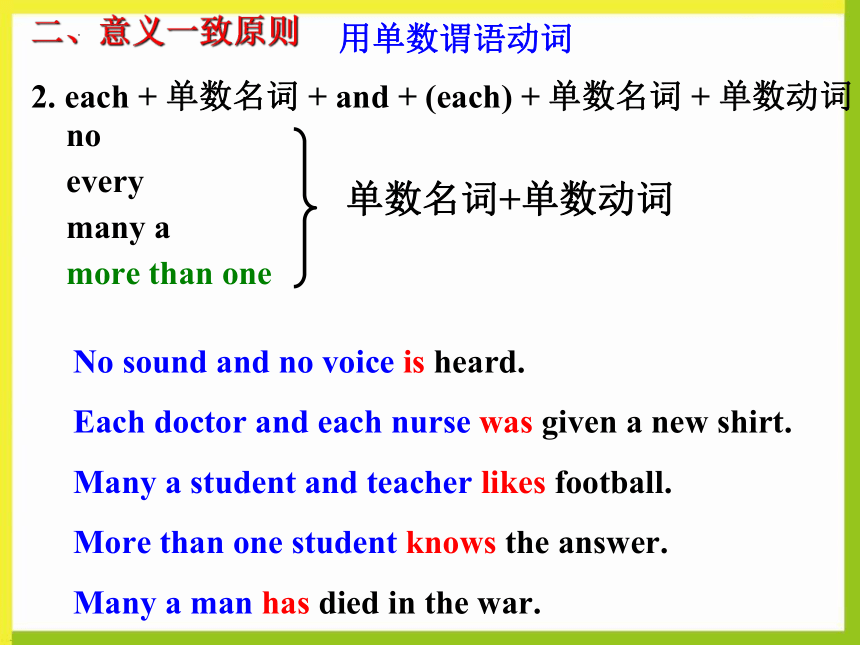


文档简介
(共21张PPT)
Grammar
Subject-Verb Agreement
主 谓 一 致
Learning Aims:
1. To summarize and review the Subject-Verb Agreement.
2. To master the usage of agreement.
Subject-Verb Agreement
主谓一致 (Period 1)
一、含义
主谓一致是指谓语动词与主语必须在人称、
数上保持一致。
I have a car, but he has two.
We were farmers 10 years ago, but he was a worker.
主谓一致四大原则
语法一致原则
意义一致原则
就近一致原则
就前一致原则
一、语法一致原则
主语是复数,谓语要用复数形式,如are, were, have等。
主语是单数,谓语要用单数形式,如:is, was, has, works等。
We work in the same company.
Two students are waiting for you in your office.
A book is lying on my desk.
She often does her homework in the morning.
We were farmers 10 years ago, but he was a worker.
二、意义一致原则
主谓语一致不是根据其外部语法形态来决定,而是取决于主语所表达的内在含义。
The crowd were fighting for their lives.
这些人正为生存而战斗。
Three years in a strange land seems like a long time.
在异乡生活的三年,仿佛是很长的时间。
意义一致原则
用单数谓语动词
用复数谓语动词
单复数视情况定
二、意义一致原则
用单数谓语动词
1. and连接的两个并列成分指的是同一概念,兼具
身份或匹配出现
Bread and butter is a daily food in the West.
The professor and writer is speaking at the meeting.
The professor and the writer are speaking at the meeting.
常见的由and连接的指一个概念的有:
the needle and thread salt and water
the folk and knife iron and steel
time and tide
针 线
盐 水
刀 叉
钢 铁
岁月
二、意义一致原则
用单数谓语动词
no
every
many a
more than one
单数名词+单数动词
No sound and no voice is heard.
Each doctor and each nurse was given a new shirt.
Many a student and teacher likes football.
More than one student knows the answer.
Many a man has died in the war.
2. each + 单数名词 + and + (each) + 单数名词 + 单数动词
二、意义一致原则
用单数谓语动词
3. one/every one/each/either/the number of + 复数名词
+单数动词
Each of the girls likes dancing.
One of them has been abroad.
The number of traffic accidents has increased.
A number of children like this song.
二、意义一致原则
用单数谓语动词
4. 由every-, some-, no-, any-和-one, -thing, -body等构成的不定代词作主语,用单数动词。
Everyone in the class was surprised at the news.
Nobody knows where she lives.
二、意义一致原则
用单数谓语动词
5. 动词-ing形式,动词不定式和名词性从句作主语
Making speeches is not her strong point.
Growing flowers needs constant watering.
To die for the people is a worthy death.
How they can finish their work is still unknown.
Where we will go has not been decided.
What he says and does doesn’t concern me.
注意:what 引导的名词性从句作主语
What we need now is water.
What we need now are books
6. 学科名称的名词作主语时
7. 国名、地名、书名、组织机构等专有名词作主语时
8. 时间、金钱、距离、重量、金钱、体积的复数名词
作主语,表示整体概念时
9. clothing, furniture, traffic, jewellery, baggage,
luggage, equipment等无生命的集体名词作主语时
二、意义一致原则
用单数谓语动词
Physics is one of my favourite subjects.
The United States is made up of 50 states.
Fifty miles is a long walk for me.
Clothing is badly needed in this flooded area.
二、意义一致原则
主谓语一致不是根据其外部语法形态来决定,而是取决于主语所表达的内在含义。
The crowd were fighting for their lives.
这些人正为生存而战斗。
Three years in a strange land seems like a long time.
在异乡生活的三年,仿佛是很长的时间。
意义一致原则
用单数谓语动词
用复数谓语动词
单复数视情况定
二、意义一致原则
用复数谓语动词
2. 有生命的集体名词
The police are running after the thief.
The cattle like eating grass in the field.
The Philippines lie to the southeast of China.
Rocky mountains stand in the west of North America.
The Olympic Games are held once every four years.
4. 群岛,山脉,瀑布,运动会等以-s结尾的专有名词
A group of girls were talking about Jay Zhou.
Large quantities of water are sent there.
A large quantity of water is sold out.
A large quantity of books are/is sold out.
二、意义一致原则
用复数谓语动词
5. a number of / quantities of / a group of +名词
A group of girls were talking about Jay Zhou.
Large quantities of water are sent there.
A large quantity of water is sold out.
A large quantity of books are/is sold out.
6. the + adj. 表示一类人或物作主语,谓语动词用复数
二、意义一致原则
用复数谓语动词
The rich are not always happy.
The wounded need help.
The disabled are paid close attention to by society.
The dying are being treated.
7. the + 姓的复数形式做主语,谓语动词用复数。
The Whites are going to make a trip to London.
The Greens were watching TV When a fire broke out.
二、意义一致原则
用复数谓语动词
8. glass, trousers, shoes, socks, chopsticks, scissors
等由两部分构成的表示衣物或工具的名词做主语
My glasses are new.
Your trousers need washing.
二、意义一致原则
主谓语一致不是根据其外部语法形态来决定,而是取决于主语所表达的内在含义。
The crowd were fighting for their lives.
这些人正为生存而战斗。
Three years in a strange land seems like a long time.
在异乡生活的三年,仿佛是很长的时间。
意义一致原则
用单数谓语动词
用复数谓语动词
单复数视情况定
二、意义一致原则
视情况定
1. 集体名词family, team, army, class, government, crowd, group, public, party 等做主语,强调整体,谓语动词用单数,强调个体,谓语动词用复数。
My family is a big one.
His family are all workers.
The army has a secret task this week.
The army are helping to clear up after the earthquake.
The government is to build a brick factory this year.
The government are holding a meeting now.
Men of this kind are in danger.
Man of this kind is in danger
Men of this kind are in danger.
Man of this kind is in danger
二、意义一致原则
视情况定
3. kind, sort, type表种类的词
This kind of flowers grows in the south of China.
Many kinds of animals are dying out.
Forty percent of the money ____ (have) been used up.
Forty percent of the workers ____ (be) out of work.
Half of the students _____ (have) left.
Half of the fruit _____ (go) bad.
None of the money in the drawer ___ (be) mine.
None of the boys here _____ (like) dancing.
Three fourths of the surface of the earth ___ (be) sea.
Three fourths of the people ____ (be) against the plan.
二、意义一致原则
视情况定
has
are
have
goes
is
like
is
are
Forty percent of the money ____ (have) been used up.
Forty percent of the workers ____ (be) out of work.
Half of the students _____ (have) left.
Half of the fruit _____ (go) bad.
None of the money in the drawer ___ (be) mine.
None of the boys here _____ (like) dancing.
Three fourths of the surface of the earth ___ (be) sea.
Three fourths of the people ____ (be) against the plan.
定语从句的主谓一致
三、就近一致原则
四、就前一致原则
注意:疑问句的就近一致
Either he or you are right.
Is either he or you right
补充:
He is one of the boys who have been there.
He is the (only) one of the boys who has been there.
He is one of the boys who have been there.
He is the (only) one of the boys who has been there.
Grammar
Subject-Verb Agreement
主 谓 一 致
Learning Aims:
1. To summarize and review the Subject-Verb Agreement.
2. To master the usage of agreement.
Subject-Verb Agreement
主谓一致 (Period 1)
一、含义
主谓一致是指谓语动词与主语必须在人称、
数上保持一致。
I have a car, but he has two.
We were farmers 10 years ago, but he was a worker.
主谓一致四大原则
语法一致原则
意义一致原则
就近一致原则
就前一致原则
一、语法一致原则
主语是复数,谓语要用复数形式,如are, were, have等。
主语是单数,谓语要用单数形式,如:is, was, has, works等。
We work in the same company.
Two students are waiting for you in your office.
A book is lying on my desk.
She often does her homework in the morning.
We were farmers 10 years ago, but he was a worker.
二、意义一致原则
主谓语一致不是根据其外部语法形态来决定,而是取决于主语所表达的内在含义。
The crowd were fighting for their lives.
这些人正为生存而战斗。
Three years in a strange land seems like a long time.
在异乡生活的三年,仿佛是很长的时间。
意义一致原则
用单数谓语动词
用复数谓语动词
单复数视情况定
二、意义一致原则
用单数谓语动词
1. and连接的两个并列成分指的是同一概念,兼具
身份或匹配出现
Bread and butter is a daily food in the West.
The professor and writer is speaking at the meeting.
The professor and the writer are speaking at the meeting.
常见的由and连接的指一个概念的有:
the needle and thread salt and water
the folk and knife iron and steel
time and tide
针 线
盐 水
刀 叉
钢 铁
岁月
二、意义一致原则
用单数谓语动词
no
every
many a
more than one
单数名词+单数动词
No sound and no voice is heard.
Each doctor and each nurse was given a new shirt.
Many a student and teacher likes football.
More than one student knows the answer.
Many a man has died in the war.
2. each + 单数名词 + and + (each) + 单数名词 + 单数动词
二、意义一致原则
用单数谓语动词
3. one/every one/each/either/the number of + 复数名词
+单数动词
Each of the girls likes dancing.
One of them has been abroad.
The number of traffic accidents has increased.
A number of children like this song.
二、意义一致原则
用单数谓语动词
4. 由every-, some-, no-, any-和-one, -thing, -body等构成的不定代词作主语,用单数动词。
Everyone in the class was surprised at the news.
Nobody knows where she lives.
二、意义一致原则
用单数谓语动词
5. 动词-ing形式,动词不定式和名词性从句作主语
Making speeches is not her strong point.
Growing flowers needs constant watering.
To die for the people is a worthy death.
How they can finish their work is still unknown.
Where we will go has not been decided.
What he says and does doesn’t concern me.
注意:what 引导的名词性从句作主语
What we need now is water.
What we need now are books
6. 学科名称的名词作主语时
7. 国名、地名、书名、组织机构等专有名词作主语时
8. 时间、金钱、距离、重量、金钱、体积的复数名词
作主语,表示整体概念时
9. clothing, furniture, traffic, jewellery, baggage,
luggage, equipment等无生命的集体名词作主语时
二、意义一致原则
用单数谓语动词
Physics is one of my favourite subjects.
The United States is made up of 50 states.
Fifty miles is a long walk for me.
Clothing is badly needed in this flooded area.
二、意义一致原则
主谓语一致不是根据其外部语法形态来决定,而是取决于主语所表达的内在含义。
The crowd were fighting for their lives.
这些人正为生存而战斗。
Three years in a strange land seems like a long time.
在异乡生活的三年,仿佛是很长的时间。
意义一致原则
用单数谓语动词
用复数谓语动词
单复数视情况定
二、意义一致原则
用复数谓语动词
2. 有生命的集体名词
The police are running after the thief.
The cattle like eating grass in the field.
The Philippines lie to the southeast of China.
Rocky mountains stand in the west of North America.
The Olympic Games are held once every four years.
4. 群岛,山脉,瀑布,运动会等以-s结尾的专有名词
A group of girls were talking about Jay Zhou.
Large quantities of water are sent there.
A large quantity of water is sold out.
A large quantity of books are/is sold out.
二、意义一致原则
用复数谓语动词
5. a number of / quantities of / a group of +名词
A group of girls were talking about Jay Zhou.
Large quantities of water are sent there.
A large quantity of water is sold out.
A large quantity of books are/is sold out.
6. the + adj. 表示一类人或物作主语,谓语动词用复数
二、意义一致原则
用复数谓语动词
The rich are not always happy.
The wounded need help.
The disabled are paid close attention to by society.
The dying are being treated.
7. the + 姓的复数形式做主语,谓语动词用复数。
The Whites are going to make a trip to London.
The Greens were watching TV When a fire broke out.
二、意义一致原则
用复数谓语动词
8. glass, trousers, shoes, socks, chopsticks, scissors
等由两部分构成的表示衣物或工具的名词做主语
My glasses are new.
Your trousers need washing.
二、意义一致原则
主谓语一致不是根据其外部语法形态来决定,而是取决于主语所表达的内在含义。
The crowd were fighting for their lives.
这些人正为生存而战斗。
Three years in a strange land seems like a long time.
在异乡生活的三年,仿佛是很长的时间。
意义一致原则
用单数谓语动词
用复数谓语动词
单复数视情况定
二、意义一致原则
视情况定
1. 集体名词family, team, army, class, government, crowd, group, public, party 等做主语,强调整体,谓语动词用单数,强调个体,谓语动词用复数。
My family is a big one.
His family are all workers.
The army has a secret task this week.
The army are helping to clear up after the earthquake.
The government is to build a brick factory this year.
The government are holding a meeting now.
Men of this kind are in danger.
Man of this kind is in danger
Men of this kind are in danger.
Man of this kind is in danger
二、意义一致原则
视情况定
3. kind, sort, type表种类的词
This kind of flowers grows in the south of China.
Many kinds of animals are dying out.
Forty percent of the money ____ (have) been used up.
Forty percent of the workers ____ (be) out of work.
Half of the students _____ (have) left.
Half of the fruit _____ (go) bad.
None of the money in the drawer ___ (be) mine.
None of the boys here _____ (like) dancing.
Three fourths of the surface of the earth ___ (be) sea.
Three fourths of the people ____ (be) against the plan.
二、意义一致原则
视情况定
has
are
have
goes
is
like
is
are
Forty percent of the money ____ (have) been used up.
Forty percent of the workers ____ (be) out of work.
Half of the students _____ (have) left.
Half of the fruit _____ (go) bad.
None of the money in the drawer ___ (be) mine.
None of the boys here _____ (like) dancing.
Three fourths of the surface of the earth ___ (be) sea.
Three fourths of the people ____ (be) against the plan.
定语从句的主谓一致
三、就近一致原则
四、就前一致原则
注意:疑问句的就近一致
Either he or you are right.
Is either he or you right
补充:
He is one of the boys who have been there.
He is the (only) one of the boys who has been there.
He is one of the boys who have been there.
He is the (only) one of the boys who has been there.
